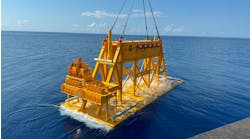Victor Schmidt
Houston
Global competition for capital forcing changes
Governments are a service business, organized to meet the broader needs of a nation or people. They may be insular, relying on internal tax receipts, or may participate in the world market for funding, seeking external investors and project money.When they go to the global economy, they face competition for investment money. Investors seek monetary gain from their at-risk funds and will not tolerate instability or unexpected government policy changes; witness the flight from Southeast Asia's collapsed economies. Investors that cannot or will not leave a troubled market demand a risk premium for their invested funds and future participation.
Competition is good. It creates wider choices, tailors project size and scope to each investor's risk tolerance and capital resources, and brings more goods to the market at reasonable prices. Many governments have had to learn to compete and court international oil investors (mostly operators) since the collapse of the Soviet Union. The results produce a favorable economic relationship for all - investors, businesses, governments, and consumers.
Namibia relaxing licensing terms
The opening of the Third Namibian Licensing Round spotlighted the need of governments to respond to the changing economic climate. Namibian officials demonstrated their desire to compete for oil funding by altering their financial terms:- Royalty - Reduced to 5%; formerly 12.5%. It is payable quarterly and may be deferred in certain cases.
- Income taxes - Reduced to 35%; the Petroleum Income Tax was 42%. Exploration and operating expenses can be written off immediately while development expenses can be depreciated over three years.
- Profit taxes - Modified into a three-tiered structure and charged to after-tax cash flow. The Additional Profit Tax is only paid on the inflation adjusted rate-of-return at the 15%, 20% and 25% levels. Tiers above these levels are biddable.
- Education - Training is required but is biddable as part of the submitted offer.
Saudi talks involve deeper issues
Low oil prices coupled with the economic collapse in Southeast Asia are forcing changes in government policies everywhere. For example, Saudia Arabia's Crown Prince Abdullah ibn Abdulaziz recently held talks with executives from Arco, Chevron, Conoco, Exxon, Mobil, Philips and Texaco in McLean, Virginia, USA.The Saudi's are seeking to reestablish an "energy relationship" with American oil companies. The Crown Prince solicited recommendations about a future role for the companies in Saudi Arabia. This action may be the beginning of major competitive changes in the structure of the worldwide oil business.
Political reasons also are a factor in reestablishing a US oil company presence. If there is major American investment in Saudi Arabia, then the US military will likely maintain a strong presence in the region.
Also, the move provides a counterweight to Iran, Iraq, and other forces with designs on Saudi oil resources. The Saud family must also face a change of leadership in the future and wants that natural transition to be as uneventful as possible.
Petroleum industry compressing further
How is the business community responding to the world's financial squeeze - by consolidations and layoffs. Over the past 10 years, the oil companies stripped themselves down to a skeleton force and outsourced much of their work to the service industry. Now, the service industry is compressing.Services are consolidating specialty businesses to become "full-service" conglomerates for the outsourcing business model. The three major players - Schlumberger, Hallibuton, and Baker Hughes - now control about 50% of the market. Realizing economies of scale, they are eliminating duplicate manpower.
While consolidation may make some short-term business sense, it assumes a continuing, immediately available supply of educated and talented petroleum professionals for future expansion. The systemic problem prevalent in current thinking is that management serves only the short-term investor, not the interests of the longer-term business.
We still hear the cry "There are no (new) people." An 8-10 year experience time frame is required to produce competent professionals. How can the industry expect new people to accept an oil career without providing a place for them?
Other challenges creeping into business
Other issues creeping into the petroleum business, caused by global financial problems, include the following:- Vulnerability: Manufacturing's just-in-time philosophy is driving much of industry's current efforts. The effects on the industry are increased exposure to events that delay or interfere with a project's critical path.
- Compressed cycle-time: A just-in-time exploration/development/production approach is a strategy to enhance productivity by packing more projects into a year. This works best on projects that have many common elements - a form of standardization. This has two dangers: it limits creativity and creates a preference for a standard solution. When the speed of the production line rules, quality falters.
- Capital risk exposure: More projects in a shorter time frame in deeper water with tighter critical path tolerances require more working capital to weather the investment curve. Financial exposure is higher. The pre-payout investment curve goes more negative with a (hopefully) shorter breakeven point and stronger cash flow over a shorter overall project life. This means higher project volatility.
- Mergers: Is bigger better? There are now three super-majors: Royal Dutch/Shell, Exxon, and BP/Amoco. Two more may emerge as large companies attempt to compete with size. Generally, a larger reserve base allows greater financial flexibility. Is this still an appropriate model if the market is seeking just-in-time reserves?
Opportunity/danger
Government collapse, street riots, and IMF loans (or lack thereof) characterized the past few months as Southeast Asian countries faced their economic collapse. Indonesia is chaotic and other nations are weak. South Korea and Thailand are stabilizing. Bank restructuring began in Japan. A recent Wall Street Journal article had this comment by Chumpol Phornprapha, Chairman of Thailand's S.P. International, "It could be another two or three years before we bottom out."Capital continues to flee the region. However, for the long-term player and those seeking expansion, it is a great time to scout for survivors, establish relationships and take positions with profit potential in the 5-10 year timeframe.
Oil and service companies should remember the very strong growth of the region before the collapse of private credit markets. That growth was the engine of oil demand expansion in 1997 and will be again.
Copyright 1998 Oil & Gas Journal. All Rights Reserved.


